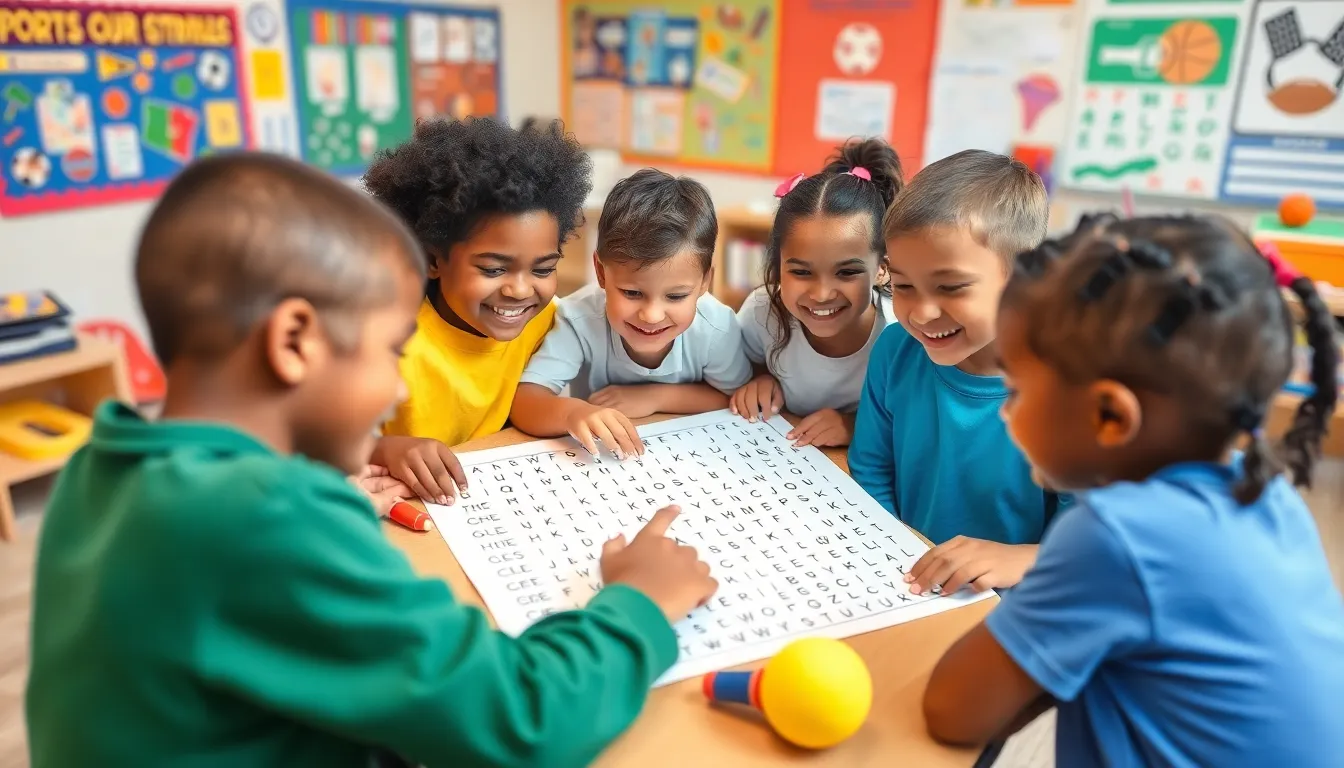Table of Contents
ToggleKids love sports, and what better way to combine their passion for play with a fun brain workout than a sports word search? This engaging activity not only keeps their minds sharp but also introduces them to a world of athletic terminology. Imagine the thrill of uncovering words like “soccer,” “basketball,” and “gymnastics” while honing their problem-solving skills.
What Is a Sports Word Search for Kids?
A sports word search for kids is a fun, educational activity designed to enhance vocabulary and mental agility. These puzzles consist of a grid filled with letters, where children search for specific words related to various sports. Words may include terms like “football,” “baseball,” and “tennis,” allowing young athletes to connect with their favorite activities.
This engaging game serves multiple purposes. It encourages children to concentrate on locating words while promoting problem-solving skills. As kids scan the grid, they develop the ability to recognize patterns and improve cognitive function. Sports word searches can be adapted for different age groups, ensuring accessibility for all skill levels.
Incorporating a sports theme also sparks interest. Kids familiar with sports terminology find joy in spotting their favorite words. Teachers and parents can use these activities to reinforce learning, making them versatile educational tools. Many printable versions are available, allowing for easy access at home or in the classroom.
These puzzles support reading skills too. By recognizing various terms, children expand their vocabulary. As a bonus, they familiarize themselves with the language used in sports commentary and discussions. The combination of leisure and learning results in an enriching experience that cultivates both knowledge and enjoyment.
Sports word searches make for an excellent group activity. They can be used in classrooms, during family game nights, or as part of sports camps. Collaborative problem-solving fosters teamwork while kids enjoy a shared experience. Engaging in these puzzles promotes not just learning, but also social interaction and fun.
Sports word searches for kids blend enjoyment with education, making them a popular choice among parents, educators, and children alike. They introduce essential vocabulary while supporting key developmental skills, all within an entertaining format.
Benefits of Sports Word Searches


Sports word searches provide various advantages that significantly benefit children’s development. These puzzles engage kids while promoting an understanding of athletic terms and concepts.
Enhancing Vocabulary Skills
Focusing on sports vocabulary, these word searches boost language acquisition. Children encounter terms like “hockey,” “swimming,” and “gymnastics” regularly while working through the puzzles. They practice spelling and recognition skills, which can transfer to reading and writing activities. Educational settings benefit because teachers can use these word searches to reinforce classroom learning. Engaging with familiar terms motivates kids to learn and explore sports, leading to increased discussions about activities they enjoy.
Promoting Attention to Detail
Word searches train children to pay close attention to letters and patterns. Finding each word requires concentration and discerning small differences between similar letter arrangements. This activity sharpens analytical skills, which serve children well in academic settings and everyday life. Children learn to approach tasks methodically, enhancing their problem-solving abilities. Through repeated exposure to these puzzles, they develop patience and persistence, qualities that contribute positively to their overall growth.
How to Create a Sports Word Search
Creating a sports word search involves a few essential steps that ensure the puzzle is both engaging and educational.
Choosing the Right Sports Terms
Selecting appropriate sports terms is crucial. Consider the age group and interests of the children. Popular terms include “soccer,” “football,” and “tennis.” Incorporating a mix of easy and challenging words keeps the activity stimulating. Research trending sports among kids to align the terms with their preferences. Including 10 to 15 terms strikes a balance between challenge and manageability. Ensure that words represent diverse sports, fostering a broad understanding of athletic vocabulary.
Designing the Word Search Layout
Designing an effective layout brings the word search to life. Begin with a grid, usually ranging from 10×10 to 15×15 squares. Randomly place chosen words in various directions—horizontally, vertically, and diagonally—to increase difficulty. Fill remaining spaces with random letters, avoiding any predictable patterns. Make the grid visually appealing by using bold lines or colorful backgrounds. Leave space for kid’s names or fun instructions at the top. Test the puzzle yourself or ask someone else to ensure all words are findable, ensuring a delightful experience for children.
Fun Variations of Sports Word Searches
Exploring different types of sports word searches adds excitement and keeps kids engaged. Several variations exist, each tailored to capture children’s interests and enhance their learning experience.
Themed Word Searches
Themed word searches focus on specific sports or sports events. For example, a soccer-themed word search could include terms like “goal,” “referee,” and “whistle.” By choosing themes like “Olympics” or “winter sports,” kids interact with diverse vocabulary sets. Incorporating seasons or local teams further personalizes the experience, making it relevant and relatable. These specific themes facilitate deeper discussions about the sports and their rules, enhancing children’s understanding and knowledge retention.
Collaborative Word Search Activities
Collaborative word search activities encourage teamwork among children. Organizing small groups can stimulate interaction as kids work together to find words. Providing a time limit adds an element of competition, motivating kids to communicate effectively. Sharing strategies or hints fosters a sense of community while developing problem-solving skills. Creating larger, classroom-sized word searches also promotes inclusivity, allowing everyone to contribute and celebrate successes together. Engaging in these activities combines learning with social interaction, making the experience enjoyable and memorable.










